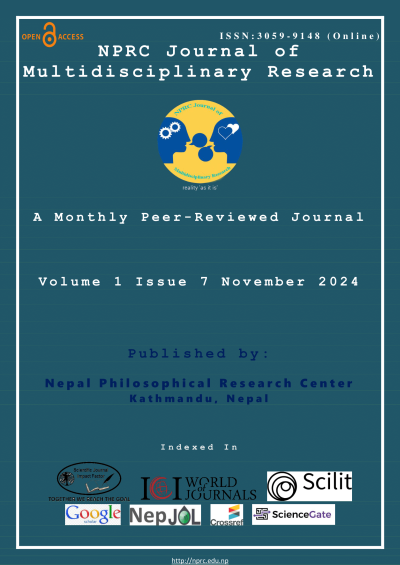Targeted Intervention Program for the Preservation of the Traditional Himalayan Buddhist Culture and Customs: A Case Study of Ananda Sangh, Kathmandu
DOI:
https://doi.org/10.3126/nprcjmr.v1i7.72461Keywords:
Preservation, monks, beneficiaries, organization, effectivenessAbstract
The main goal of Buddhist education is to free individuals from all forms of limitations and suffering. In Nepal's Gumbas, this education helps shape students' personalities based on Buddhist values. It focuses on improving ethical, intellectual, and spiritual qualities. Buddhist education encourages wisdom, kindness, fairness, rational thinking, and a sense of commitment. The main objective of this study is to access the targeted intervention (TI) program conducted by Ananda Sangh for the poor, needy, marginalized people and social institutions, especially in Jagadol, Budhanilkantha-11, Kathmandu, Nepal and communities surrounding Pullahari Monastery. Beneficiaries (Especially Monks) and observation were used to ascertain primary information whereas secondary data were collected from different project reports, published unpublished progress reports or literature and Social Welfare Evaluation Reports. Despite this, the team has done a FGD with Ananda Sangh staff and community people for data collection from the field and for triangulation. The intervention of Ananda Sangh educating 230 monks has been found to support the fundamental right of receiving quality education of the marginalized people of Nepal. However, Ananda Sangh Nepal has not yet been conducted formal social audit in the areas where it has implemented its program. The exploration of gap between policy and practice is the main area of research. What is it? Why is it a problem? And the need of any further intervention solving the current issues facing by the monks is also the target of the study. This study was conducted by the researcher during Dec 2023 and January 2024 with frequent visits to the study area.
Downloads
Downloads
Published
How to Cite
Issue
Section
License
Copyright (c) 2024 The Author(s)

This work is licensed under a Creative Commons Attribution-NonCommercial 4.0 International License.
This license enables reusers to distribute, remix, adapt, and build upon the material in any medium or format for noncommercial purposes only, and only so long as attribution is given to the creator.





